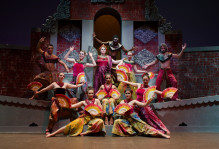AKR in Oman 3: Ethnography, Multi-tasking, and the 3rd Text
Ethnography, Multitasking, and the 3rd Text
Good morning from Muscat
As is always the case with “fieldwork” things are now moving along too quickly to record. So before I carefully choose the next set of descriptions I thought I would offer this reflection on the ethnographic method. In my published works I have written on aspects of the sonic atmosphere, and I have written on technology, particularly amplification and the revolution (at least in my work) caused by cell phones, and I have written, as all of us do, on our “fieldwork” process. Here I will try to combine all three.
Much has been made of a growing ability and desire, especially among young people for electronic multitasking. We all do it but young folks are able to text, IM, email, surf the net, listen to something or other, glance at the TV, and maybe even talk to someone in real time – all while doing their homework. Evidently we get a dopamine high when our computer “pings” telling us “you’ve got mail” or when the phone buzzes in our pocket with a new sms text message. So we get hooked. Sitting quietly and reading a book, concentrating on a lecture, even watching a film has become a challenge as these activities require a steady concentration, something that we might now call “single-tasking.” Analyze it or not, everyone is capable of multiple conversations and interactions: the simultaneous production and analysis of several “texts” if you will.
Two recent “fieldwork” events revealed to me the value of what I will call “the third text.” The lyrics of the song “Getting to Know You,” sung by the character Anna from the musical the “King and I” summarizes, somewhat whimsically, what ethnomusicologists call “fieldwork.” (See blow for the song text). Fieldwork as a term is outmoded and those of us who do it qualify the term immediately after using it in our classes, presentations, or writing. Here I cold dive deeply into a discussion about the colonialist implications of the term and the academic discourse the has inspired. But I won’t. Suffice it to say the term and its connotations are fraught with mis-representations of what we do.
Two colleagues have helped me to think about the ways I have done fieldwork. In a conversation with René Lysloff, professor at the University of California, Riverside, when I met up with him in Jogjakarta, Central Java, Indonesia, he referred to what we do as “deep hanging out.” Michele Kisliuk, another colleague and professor at the University of Virginia, has written in various places, and I’ll paraphrase her idea here, that, “we get to know others by making ourselves known to them.”
Let me describe two recent events “in the field” that involved the production and analysis of three texts simultaneously. In each case the first text was the literal conversation between myself and someone else that I was “getting to know.” Each case involved the discussion and analysis of a second text, the thing that we were both interested in, and that was the object of my ethnomusicological investigation – what I wanted to talk to the person about. The third text was something in the background that both of us simultaneously consumed and intermittently commented upon and discussed. This third text, which phased in and out of background and foreground positions as we focused our attention on it (or not) helped to inform both the first text and the second text.
On November 13 I was in Los Angeles conducting a formal interview with Wael Kakish, a musician in the Arab American music scene and the leader of the Arab community ensemble Kan Zamaan. I had heard about the activities of this ensemble for several years and I contacted Wael by email before my trip to Los Angeles, introduced myself and said that I would like to meet him. He invited me to his home and when I arrived with my zoom recorder I asked permission to turn it on. Wael’s living room was filled with CDs (as well as records and cassettes) neatly organized in bookcases from floor to ceiling. There were at least thirty musical instruments in sight and many other things that were hung on the wall or placed intentionally as a kind of performance of self. His environment told me a lot or at least suggested many things about Wael’s life and interests. Soft music was playing in the background and as we arranged ourselves on an adjacent chair and couch for the best recording he asked if he should turn it off. I thought about it, but then decided that it actually might be kind of nice to have some music playing in the background of a recorded interview as pleasant, ambient diegetic sound.
We spent about 4 hours altogether chatting, drinking coffee and discussing the Arab (American) music scene in Los Angeles. I couldn’t see the source of the music at first but the eclectic collection of recorded performances and artists kept grabbing my attention. I began to comment on the music intermittently and Wael told me that it was his iPod on shuffle: basically his entire collection – at least what he had on his iPod — randomly selected and re-ordered by whatever iPod program governs the “shuffle” process.
As Wael Kakish is a person with whom I could potentially collaborate some day, I spent plenty of time “making myself known to him.” This is perhaps the second line of Anna’s song: “Getting to like you, getting to hope you like me.” But the soundtrack of our afternoon, Wael’s iPod on “shuffle,” provided both of us an opportunity to identify with and comment upon music, the very thing that was the topic of our conversation. I certainly “got to know all about him” or at least more about him by listening to his music. And I believe Wael learned more about me and my engagement and experience with Arab and other musics as I identified various pieces, performers, and commented on them, introducing new “threads” into the emergent multiple conversations between us that were already ongoing. I was excited about the exchange because even though we weren’t actually playing music together, we were engaging with it together. This third text provided us the possibility to both “hang out” and get to know one another on an additional level, one that I had not anticipated.
Several days later on November 27, and several thousand miles away in the city of Mucat, Oman I was taken on an extensive driving tour of the city by one of my hosts, Ustaz Mohamad al-Shidhani. I met Ustaz Mohamed and his colleague Iman al-Busaidi in Washington DC on the first of October at the Sultan Qaboos Cultural Center, near Dupont Circle. The SQCC is the sponsor of my research project and Dr. Iman and Ustaz Mohamad, who are based in Oman help to oversee many of SQCC’s projects, including, we all found out that day, me!
Ustaz Mohamed met me at Al-Seeb airport after my 24-hour trip from Richmond, Virginia, helped me to change money and to get a SIM card for my cell phone – both absolutely essential for day-to-day survival. The importance of having money requires no comment. Having a cell phone and gives you an immediate identity in a brand new place and I cannot underestimate the value of both calling and texting for developing a network.
The next evening – my first real day in Oman, Ustaz Mohamed appeared to take me on a tour. I wasn’t really sure that this was what our agenda was but it became clear fairly soon that he wanted me to get my bearings and to show off the city. In this case, again, our conversation was the first text. I would say that the city of Muscat and more broadly, the country of Oman was the second text. My host was performing a show-and-tell as we drove from Qurum Beach, past all of the embassies, to the Sultan Qaboos University, past the grand mosque, posh hotels, various ministries and busy commercial districts, into the old parts of Matrah and Muscat, and along some astonishingly beautiful coastlines and boardwalks, all the way to the Shangri-la Bar Jissa resort and then back again to Qurum Beach and the location of my hotel.
Ustaz Mohamed narrated our tour and I took it all in asking questions here and there. In addition to the city we discussed aspects of our work and my project. All the while the radio played and, as in my interview with Wael each of us reached over to turn it up when there was something on of interest and to turn it down when either one of us decided our conversation was more important. Mostly I was the one who asked questions about our sound track – what style of music was this? what did the DJ say? what does this word mean? And sometimes I commented, “Ah Farid al-Atrash, is he also popular among Omanis?” My host also commented on the radio broadcast pointing out, for example, “this is the most popular song that was written for His Majesty this year, indeed, this is the song of the month! Here, I will translate the lyrics for you.” Obviously I was the student and Ustaz Mohamad, the teacher in this setting but I think, that by having that third text there I was able to spontaneously demonstrate and he to observe, the kinds of questions about music that I like to ask, my ability to engage with, understand and use the Arabic language, and my appreciation of and experience with Arab culture generally. It helped me in the part of Anna’s song that says: “Getting to hope you like me.”
To return to the ideas of my colleagues Michele Kisliuk and René Lysloff, the process of getting to know all about someone or something or somewhere or of making ourselves known to others can take a lifetime. I won’t presume that my interview with Wael Kakish or my first meeting with Ustaz Mohamed were both more than just a beginning. And I would hardly call our meetings “deep hanging out” as this is something that you do with people that you know well or are with for a long time. I will say that spending an afternoon drinking coffee and talking about music, or driving around while chatting and listening to the radio does constitute a certain kind of “hanging out,” however formal it was, and that our third text helped us go a long way toward the realization of at least the beginning Anna’s song – the thing that ethnomusicologists sometimes call “fieldwork.”
Getting to know you, getting to know all about you,
Getting to like you, getting to hope you like me.
Excerpt from “The King and I” by Richard Rogers and Oscar Hammerstein




No comments.
Comments are currently closed. Comments are closed on all posts older than one year, and for those in our archive.